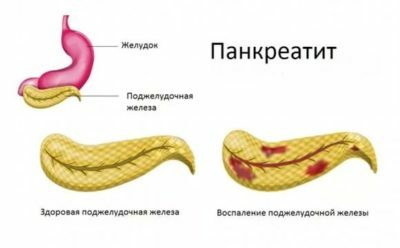The prevalence of pancreatic fibrosis is increasing every year. This is primarily due to the increased detection rate in patients of chronic and acute pancreatitis. According to statistics, pathology diagnosed in 45% of patients suffering from pancreatic diseases.

general information
Fibrosis (fibromatosis) - is the pathological changes in the pancreas, which involve replacement of functioning tissue connecting epithelium. The organ itself is composed of two types of tissues: the stroma and parenchyma. In long-term impact of adverse factors on the pancreas begins destruction of its cells. It was at this point and there is a replacement of the glandular epithelium in the connective tissue.
In that case, when the dead cells are replaced by scar tissue, the patient develops fibrosis. If the functional epithelium replaces fatty tissue, there lipomatosis. Often, the replacement of affected parts of the body takes place at the same time the fat and scar tissue. In such cases, the patient appears lipofibroz pancreas. This type of pathology is typical for people who suffer from diabetes.
All kinds of diseases are very dangerous as they progress leads to functional impairment authority. The reason lies in the fact that, unlike the connecting glandular epithelium tissue is not capable to produce hormones and enzymes. In addition, fibrosis, lipomatosis and fibrolipomatoz pancreas is an irreversible process that is affected functional tissue can not be restored in such pathologies.
pathology Causes
The main reason for the development of fibrosis, pancreatitis is both acute and chronic forms. Studies have shown that the immediate foci connective tissue occur in acute, and the area of their distribution is directly dependent on the duration of the disease. In addition, fibrotic changes in the pancreas can be triggered by the following factors:
- excessive alcohol consumption;
- smoking;
- obesity;
- cystic fibrosis;
- pancreatic injury;
- pathology gallbladder and biliary tract;
- exposure to toxic substances of various origins;
- genetic predisposition;
- infectious processes in the body, including the influenza virus;
- error in the diet;
- stress;
- excess hormone produced by the pancreas;
- autoimmune and allergic diseases;
- inflammation of the duodenum;
- the uncontrolled use of certain medications.
The risk group includes people working in hazardous work areas, as well as men and women older than 55 years.
clinical picture
Symptoms of fibrosis of the pancreas in the first place depends on the precipitating cause. Thus in the initial stage of the disease, clinical signs may be absent altogether.
When the gland body defeat the patient develops pain in the epigastric region. If you hurt the head or body tail, pain will occur in the right and left hypochondria.
Most pronounced painful sensations arise when errors in the diet. For example, after the oily and spicy food or alcohol consumption.
Gradually fibrosis progresses, deficiency of digestive enzymes appears, and the clinical picture supplemented by the following signs:
- nausea and vomiting;
- bloating;
- diarrhea;
- belching;
- loss of appetite;
- weight loss;
- intolerance to fatty foods.
In some cases, in violation of absorption of trace elements in a patient, and fat-soluble vitamins may develop muscle weakness, osteoporosis, or blindness. If fibrotic changes affect islet cell device, the first to suffer endocrine organ function. Against the background of these changes in a patient shows signs of diabetes:
- frequent urination;
- thirst;
- dryness of skin and mucous membranes;
- drowsiness;
- itching;
- chronic fatigue syndrome.
fibrosis danger lies in the fact that at the initial stage of the disease often develops asymptomatically. Pronounced signs generally appear only during exacerbation of the process. Therefore, for the timely diagnosis of disease need to pass medical examinations every year.
methods of diagnosis
At the slightest suspicion of fibrotic seal should consult a gastroenterologist. Significant seal pancreas doctor will be able to identify the spending authority palpation.
Laboratory blood tests will help to identify a lack of protein and a decrease in the albumin-globulin factor. By low activity of amylase (pancreatic enzyme) can be judged on the incidence of the pathological process. To identify fibrosis in most cases helps ultrasound. This diagnosis allows to evaluate the following parameters gland:
- volume;
- shape;
- tissue structure;
- correct location in the abdominal cavity.
Assess the condition of the pancreas at a rate of its density and echogenicity. When sealing mucous index increased echogenicity. More information gives such a procedure as endoscopic ultrasonography. It can be used to identify hyperechogenicity parenchyma and contours tuberosity gland.
Retrograde cholangiopancreatography allows us to identify changes in ductal system, provoked by scars.
In order to confirm or refute the diagnosis, the patient body computer tomography can be assigned. If the study has not given an unequivocal result, biopsy of the pancreas.
therapeutic measures
Treatment of pancreatic fibrosis impossible. In modern medicine, there is still no drugs that can be converted back into the junctional epithelium functional tissue. All therapeutic measures are directed at symptom relief and to facilitate the patient's condition.
The first patient is prescribed a strict diet. This measure makes it possible to stop the inflammation and relieve the pancreas. From the patient's diet exclude spicy, fatty, smoked, salted, fried and roughage. Furthermore, it is necessary to abandon the products enhancing secretion of gastric juice (seasonings, sauces, marinades). Nutrition should be a fraction, and the patient should drink plenty of fluids. Alcohol fibrosis (even small amounts) is strictly forbidden.
An important factor in the treatment of the disease is to control the level of enzymes. Also, depending on the cause, triggering inflammation, a gastroenterologist can assign the following groups of drugs:
- antispasmodics;
- steroids;
- interferons;
- antibiotics;
- analgesics;
- antiemetic;
- digestive enzymes.
If you treat the fibrosis in the right way, then the patient has normal digestion, weight loss stops. But there are some cases in which you might require surgical or endoscopic intervention. For example, if:
- constant pain syndrome, intractable inflammatory analgesics;
- squeezing pancreatic stream;
- in tumor tissue degeneration;
- the development of the iron Postnecrotic cysts;
- obstructive jaundice.
Favorable prognosis in fibrosis depends on how extensively struck iron. With diet and all medical prescriptions, giving up alcohol and smoking for a long time the disease can not develop.
pathology Prevention
The earlier prevention, especially in the disease are less likely to develop. Especially this rule applies to people suffering from pancreatitis. In order to reduce the risk of fibrosis or stop its progress, you must:
- eliminate alcohol;
- stop smoking;
- control the amount of food consumed.
You also need to monitor the quality of food eaten and drink during the day plenty of water. Any chronic diseases should be treated in time, especially pancreatic pathologies. Healthy lifestyle and the lack of stress significantly reduce the risk of fibrosis.



